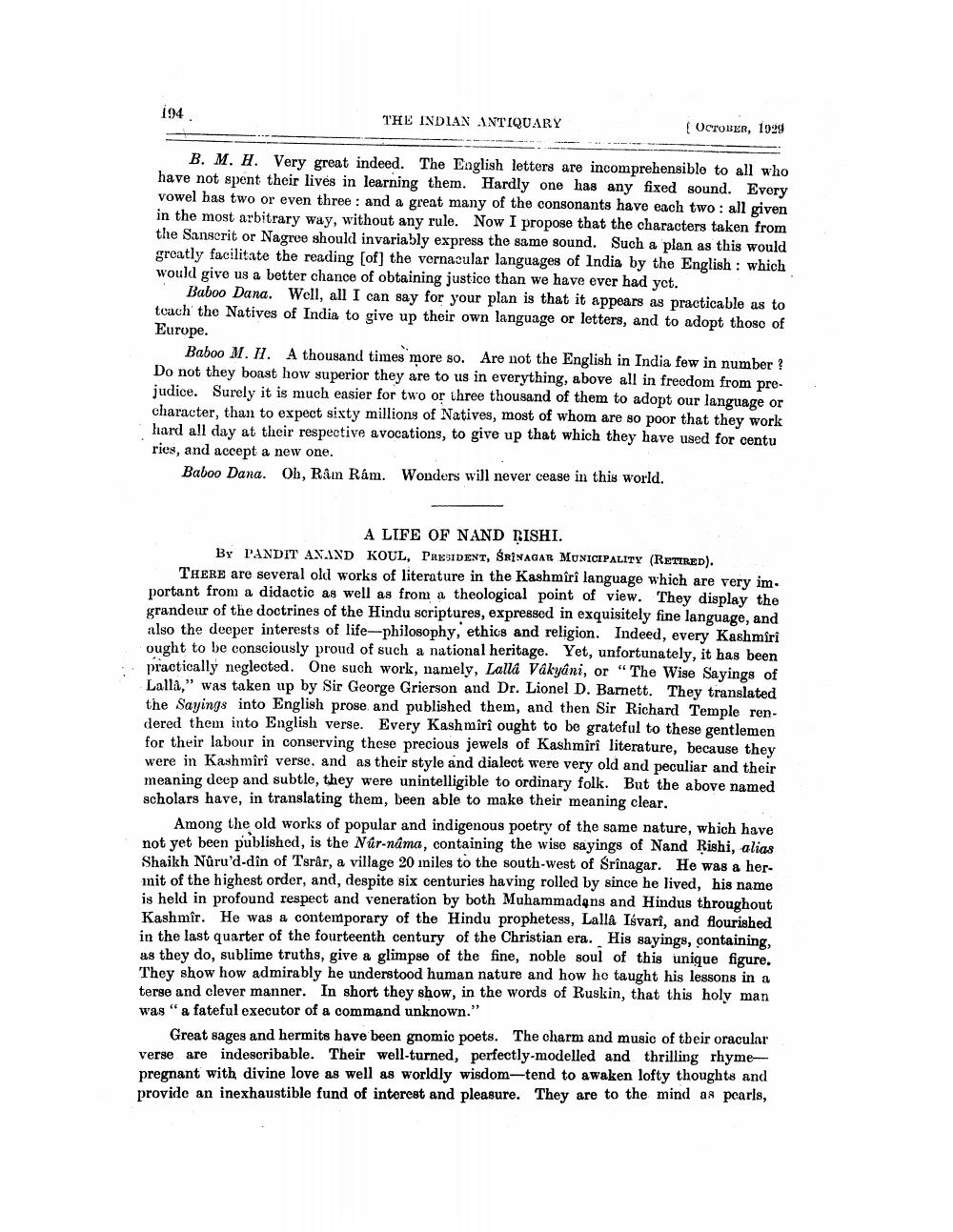________________
194
THE INDIAN INTIQUARY
[ OCTOBER, 1929
B. M. H. Very great indeed. The English letters are incomprehensible to all who have not spent their lives in learning them. Hardly one has any fixed sound. Every vowel has two or even three : and a great many of the consonants have each two: all given in the most arbitrary way, without any rule. Now I propose that the characters taken from the Sanscrit or Nagree should invariably express the same sound. Such a plan as this would greatly facilitate the reading (of) the vernacular languages of India by the English: which would give us a better chance of obtaining justice than we have ever had yet.
Baboo Dana. Well, all I can say for your plan is that it appears as practicable as to teach the Natives of India to give up their own language or letters, and to adopt those of Europe.
Baboo M. H. A thousand times more so. Are not the English in India few in number? Do not they boast how superior they are to us in everything, above all in freedom from prejudice. Surely it is much easier for two or three thousand of them to adopt our language or character, than to expect sixty millions of Natives, most of whom are so poor that they work hard all day at their respective avocations, to give up that which they have used for centu ries, and accept a new one.
Baboo Dana. Oh, Ram Rám. Wonders will never cease in this world.
A LIFE OF NAND RISHI. BY PANDIT AXUND KOUL, PRESIDENT, SRINAGAR MUNICIPALITY (RETIRED). There are several old works of literature in the Kashmîrî language which are very im. portant from a didactic as well as from a theological point of view. They display the grandeur of the doctrines of the Hindu scriptures, expressed in exquisitely fine language, and also the deeper interests of life-philosophy, ethics and religion. Indeed, every Kashmiri ought to be consciously proud of such a national heritage. Yet, unfortunately, it has been practically neglected. One such work, namely, Lalla Vâkyâni, or "The Wise Sayings of Lalla," was taken up by Sir George Grierson and Dr. Lionel D. Barnett. They translated the Sayings into English prose and published them, and then Sir Richard Temple ren. dered them into English verse. Every Kashmiri ought to be grateful to these gentlemen for their labour in conserving these precious jewels of Kashmiri literature, because they were in Kashmiri verse, and as their style and dialect were very old and peculiar and their meaning deep and subtle, they were unintelligible to ordinary folk. But the above named scholars have, in translating them, been able to make their meaning clear.
Among the old works of popular and indigenous poetry of the same nature, which have not yet been published, is the Nar-náma, containing the wiso sayings of Nand Rishi, alias Shaikh Nuru'd-dîn of Tsrår, a village 20 iniles to the south-west of Srinagar. He was a hermit of the highest order, and, despite six centuries having rolled by since he lived, his name is held in profound respect and veneration by both Muhammadans and Hindus throughout Kashmir. He was a contemporary of the Hindu prophetess, Lalla Isvari, and flourished in the last quarter of the fourteenth century of the Christian era. His sayings, containing, as they do, sublime truths, give a glimpse of the fine, noble soul of this unique figure. They show how admirably he understood human nature and how ho taught his lessons in a terge and clever manner. In short they show, in the words of Ruskin, that this holy man was "a fateful executor of a command unknown.”
Great sages and hermits have been gnomic poets. The charm and music of their oracular verse are indescribable. Their well-turned, perfectly-modelled and thrilling rhyme pregnant with divine love as well as worldly wisdom-tend to awaken lofty thoughts and provide an inexhaustible fund of interest and pleasure. They are to the mind as pearls,




